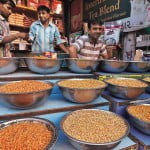
The Centre’s ambitious scheme of Mega Food Parks (MFP) in India is stumbling with some missing deadlines while others not meeting the basic purpose of project, a recent report by Indian Council for Research on International Economic Relations (ICRIER) revealed.
The report submitted to the Ministry of Food ProcessingIndustries has found several loopholes in the effectiveness of the scheme and mad recommendations to redesign its guidelines and increase flexibility.
The surveyors studied four schemes associated with Mega Food Parks i.e. Scheme for Integrated Textile Parks (SITP), Mega Leather Cluster scheme and Scheme for setting up of plastic parks. “In most cases, before launching the scheme no study was done on global best practices or on similar successful international parks or clusters.
All the schemes stress on enhancing domestic capabilities of the Indian (Small and Medium-sized Enterprises (SMEs )) and only some emphasise of increasing India’s share in international trade,” the report said. “However, not much importance is given to linking India to the global value chain. The objective in schemes such as the MFP does not refer to increasing export or any form of global linkages.
This is an area of concern especially since the Prime Minister Narendra Modi has recently launched the ‘Make in India’ campaign, which focuses on attracting global investors to invest in India for domestic and global markets,” it added.
Financial issues were found to be one of major reasons for incomplete projects. Four of the studied operational MFPs were yet to achieve financial closure. None of the projects were completed at the time of survey. The most significant reason for delay is failure of MFPs in construction of Primary Processing Centres (PPCs). The surveyors found that none of the operational MFPs had completely received the grant amount and most of them mentioned that this was because the PPCs and collection centres are yet to be operational.
The survey found that in order to create world class facilities, all the food parks have imported machineries from abroad which are expensive.
Hence the rent or the lease amount for these facilities is also expected to be high. In some cases small and medium food processors said that they will not be able to afford these facilities. In case of PPCs, their economic viability also depends on the rental that they charge. Even if the PPC has a state of the art infrastructure the users may not be willing or may not have the ability to pay a high rental.
The survey found that farmers usually opt for the facilities with lower rental. This, in turn, leads to the low usability of the PPC.
The scheme was rolled-out in 2008-09 with allocation of 42 food parks. Allotment of 17 was recently cancelled.
[“source -financialexpress”]




